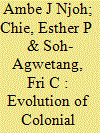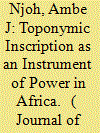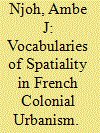|
|
|
Sort Order |
|
|
|
Items / Page
|
|
|
|
|
|
|
| Srl | Item |
| 1 |
ID:
183688


|
|
|
|
|
| Summary/Abstract |
The study examines Germano-Anglo colonial towns in Cameroon to determine factors accounting for the scarcity of infrastructure as well as streets and places with Eurocentric names. Using primary and secondary data, it demonstrates that the lack of infrastructure in the polity is a function of negligence by colonial and post-colonial authorities. With few pieces of public infrastructure, the authorities have had few streets and places to attribute names from Eurocentric lexical dictionaries. These findings contribute to knowledge of the relative impact of endogenous and exogenous factors on toponymic traditions as well as inter-country differentials in African countries’ development profiles.
|
|
|
|
|
|
|
|
|
|
|
|
|
|
|
|
| 2 |
ID:
168586


|
|
|
|
|
| Summary/Abstract |
The recent shift in the study of toponyms has drawn substantial attention from political geographers. The aim of this study is to demonstrate how toponymic inscription is a territorial project that involves the contesting of different naming regimes and political subjects. Through an examination of the history of toponymic inscription in Taiwan, it is first argued that different naming regimes have attempted to inscribe their political subjectivities onto the island with a view to asserting their spatial domination. Second, it is proposed that the connection between regime change and toponymic renaming is contingent, and has affected the ability of the new naming regime to draw temporal boundaries. Finally, it is contended that marginalised groups have resorted to toponymic struggle to reclaim the ‘lost’ sovereignty from the ruling regime. This study provides an overview of and insights into the different episodes of toponymic hegemony, politicking and resistance that have taken place in Taiwan.
|
|
|
|
|
|
|
|
|
|
|
|
|
|
|
|
| 3 |
ID:
179103


|
|
|
|
|
| Summary/Abstract |
The study employs in-situ primary data supplemented with secondary information from conventional archival sources to examine the toponymic experience of Ethiopia, one of only two African countries without a colonial history. The focus is on Mekelle, the country’s third largest city. The city’s spatial structure is nondescript. The streets are identified with a string of numbers, which are placed at irregular intervals. Most landmarks are unnamed whereas buildings are unnumbered. This paper shows that the absence of a precise and unambiguous street, place and property identification system in the city stifles its performance in the urban management, economic, and social milieus.
|
|
|
|
|
|
|
|
|
|
|
|
|
|
|
|
| 4 |
ID:
157195


|
|
|
|
|
| Summary/Abstract |
This study analyses toponymic inscription, the exercise of street/place naming, as a tool for articulating power in Anglophone and Francophone Africa. The focus is on Dakar, Senegal and Nairobi, Kenya, which were respectively indispensable for the colonial projects of France and Britain in Africa. Dakar was for France’s West African Federation what Nairobi was for Britain’s colonial East Africa. It is shown that toponymic inscription was used with equal zeal by French and British colonial authorities to express power in built space. Thus, both authorities used the occasion to christen streets and places as an opportunity to project Western power in Africa. With the demise of colonialism, indigenous authorities in Kenya inherited the Western vocabulary of spatiality but speedily moved to supplant Eurocentric with Afrocentric street/place-names. In contrast, post-colonial authorities in Senegal remain wedded to the colonial tradition of drawing most important street- and place-names from the Eurocentric cultural lexicon. Consequently, although the vocabulary of spatiality in Nairobi projects African nationalism and power, that of Dakar continues to express mainly Western power.
|
|
|
|
|
|
|
|
|
|
|
|
|
|
|
|
| 5 |
ID:
168250


|
|
|
|
|
| Summary/Abstract |
The study analyses toponymic practices in two colonial spaces on two continents. The colonial spaces, Dakar and Saigon, were capitals of the Federation of French West Africa and French Indochina, respectively. Toponymy is used as a tool to articulate socio-cultural and political power in both spaces; also, streets were christened after French military, politico-administrative and religious personalities. Two differences are noted. First, streets in colonial Saigon were named after French military heroes and clergymen, while streets in Dakar were named after French political luminaries. Second, post-colonial Saigon witnessed efforts to re-appropriate the city’s identity, but not so in Dakar.
|
|
|
|
|
|
|
|
|
|
|
|
|
|
|
|
|
|
|
|
|